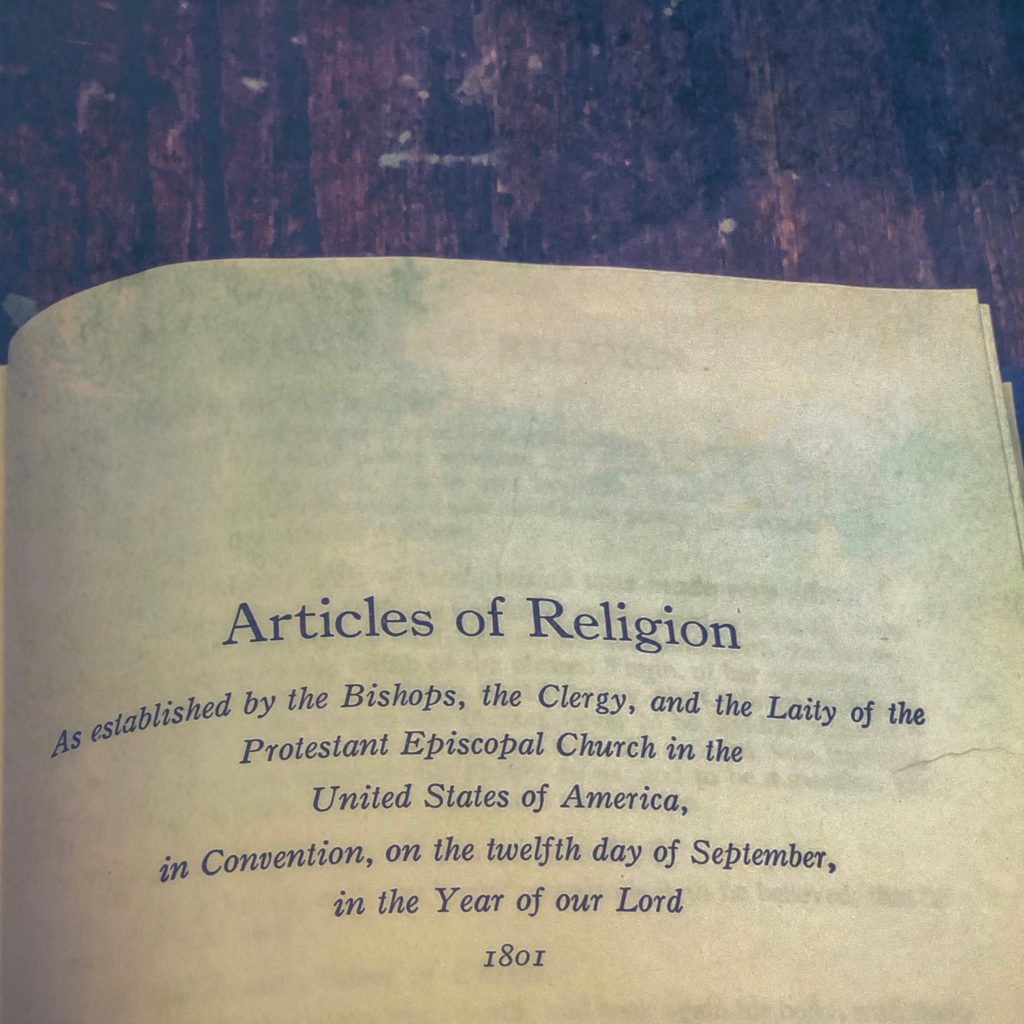
General Councils may not be gathered together without the commandment and
will of Princes. And when they be gathered together, (forasmuch as they be an assembly of men, whereof all be not governed with the Spirit and Word of God,) they may err, and sometimes have erred, even in things pertaining unto God. Wherefore things ordained by them as necessary to salvation have neither strength nor authority, unless it may be declared that they be taken out of holy Scripture.
by Maple Anglican
The Reformation was, at its very core, a paradigm shift. It began largely due to issues related to salvation theology (soteriology), before moving onto matters of Church authority (magisterium). The Western Church, quite literally, fractured itself trying to settle the roles of Scripture and Tradition in the Church, as well as who has the ultimate authority to interpret them.
Now, as in the 16 Century, the Roman Catholic Church holds that “God graciously arranged that the things he had once revealed for the salvation of all peoples should remain in their entirety”[1], and that this revelation is consists of Scripture, which is “the speech of God as it is put down in writing under the breath of the Holy Spirit.”[2], and Tradition, which is a “living transmission, accomplished in the Holy Spirit…”.[3] Roman Catholics believe that Scripture and Tradition are “bound closely together, and communicate one with the other.”[4] At the same time, the arbiter of the complete revelation is “entrusted solely to the Magisterium of the Church, that is, to the Pope and to the bishops in communion with him.”[5] The decisions of the so-called Ecumenical Councils, in which Magisterium is exercised through the Pope and the college of Bishops who operate under his authority,[6] is part of what Roman Catholics consider Tradition.
This is in stark contrast to the Anglican viewpoint that Scripture contains “all things necessary to salvation” that we saw earlier in Article VI. We have also seen it invoked to:
- Support the concepts of Predestination and Election in Article XVII,
- Support the concept of obtaining salvation only through Christ in Article XVIII, and
- Declare that the Church cannot invoke anything contrary to Scripture as per Article XX.
Now, in Article XXI, we see the primacy of Scripture brought up again. In this case, it is used to further repudiate the Roman Catholic view of Tradition, specifically with regards to Ecumenical Councils and Papal Authority. Article XXI declares:
General Councils may not be gathered together without the commandment and will of Princes.
Why does it say that Ecumenical Councils have to be called together by civil officials (i.e. Princes) and not Church officials? We have to remember that the English Reformers were supportive of Royal Supremacy, that is, that the reigning Monarch had ultimate control of both Church and State—subject, of course, to God’s will. The English Reformers could also point to the historical precedent that it was Emperor Constantine, and not any specific Bishop, who called for the Council of Nicea in 325.
Article XXI goes on by saying:
And when they be gathered together … they may err, and sometimes have erred, even in things pertaining unto God.
Here, the English Reformers establish that it is possible for an Ecumenical Council to be called together legitimately and make a judgement in error. What the Article goes on to say is:
Wherefore things ordained by them as necessary to salvation have neither strength nor authority, unless it may be declared that they be taken out of holy Scripture.
We see the main ethos of Anglicanism repeated: What is necessary for salvation must be derived from Scripture.
At this point, it is very fair to as ourselves which Ecumenical Councils, or at least which decisions at said Councils, are therefore negated by this proclamation. That depends largely on which group of Christians you are asking. If you ask Chaldean Christians in the Church of the East the answer is two. The Oriental Orthodox Christians, such as the Copts and Armenians, say there were three. Eastern Orthodox Christians will say there were at least seven. However, Article XXI was drafted with Roman Catholics in mind, and they hold that there have been 21 Ecumenical Councils:
- First Council of Nicaea (325 AD)
- First Council of Constantinople (381 AD)
- First Council of Ephesus (431 AD)
- Council of Chalcedon (451 AD)
- Second Council of Constantinople (553 AD)
- Third Council of Constantinople (680-681 AD)
- Second Council of Nicaea (787 AD)
- Fourth Council of Constantinople (869-870 AD)
- First Council of the Lateran (1123 AD)
- Second Council of the Lateran (1139 AD)
- Third Council of the Lateran (1179)
- Fourth Council of the Lateran (1215)
- First Council of Lyon (1245)
- Second Council of Lyon (1274)
- Council of Vienne (1311–1312)
- Council of Constance (1414–1418)
- Council of Basel, Ferrara and Florence (1431–1445)
- Fifth Council of the Lateran (1512–1517)
- Council of Trent (1545–1563)
- First Council of the Vatican (1870)
- Second Vatican Council (1962–1965)
With regards to this list of what Roman Catholics have declared to be Ecumenical Councils, the decisions of the first four can be entirely accepted:
- The Council of Nicea dealt primarily with the teachings of Arius, and established an early form of what we would call the Nicene Creed,
- The Council of Constantinople dealt with variations in Arianism, declared the full divinity of the Holy Spirit, and amended the Nicene Creed into the one we are more familiar with,
- The Council of Ephesus repudiated the teachings of Nestorius who stated that Christ’s human and divine natures we separated to the point it was arguable he was two persons, and
- The Council of Chalcedon declared that Christ had two equal natures, one human and one divine. This was in contrast to those saying Christ had a single, mixed nature.
It is the fifth Council, the Second Council of Constantinople, which Article XXI would seem to first be invoking. This council, like the earlier four, made a number of doctrinal declarations stating that those who denied said doctrines were anathema. While most of this council’s decisions are acceptable in the eyes of Article XXI, this Council pronounced that a Christian must believe in the perpetual virginity of the Blessed Virgin Mary.[7] Since there is not a strong scriptural case for her perpetual virginity, let alone that its belief is required of Christians, this declaration is the first example where Article XXI says that an Ecumenical Council has made an error.
The Second Council of Nicaea also seems to be partially repudiated due to Article XXI. This council was called to deal with the issue of icons, which Article XXII will speak to later. This council declared a number of anathemas, which includes those who refused to venerate icons, see value in the invocation of saints, or seek the intercession of the Blessed Virgin Mary are anathema.[8] Once again, as there is no scriptural backing for these anathemas, Article XXI would state this council had made errors.
However, the English Reformers were not just trying to repudiate the use of icons, or invocations of saints. They also wished to repudiate Roman Catholic doctrine with respect to Purgatory, indulgences and the sacraments. The first time that a Roman Catholic Ecumenical Council speaks on Purgatory was Session 6 of the Council of Florence held in 1439.[9] The validity of indulgences was pronounced at Session 8 of the Council of Constance in 1415, when said Council condemned the teachings of John Wycliffe with respect to indulgences being a ridiculous thing to believe.[10] While the Fourth Lateran Council in 1215 did not use the word transubstantiation, it most certainly states that a change of substance is happening in the Eucharist,[11] and the Council of Constance used the word when defining eucharistic presence.[12] As well, the Council of Constance declared that the Church held there were seven sacraments.[13] Article XXI could thus be used to repudiate these Medieval Councils.
However, the Articles of Religion were originally proclaimed in 1562 during the Council of Trent. Article XXI can thus be viewed as a contemporary statement against the decrees of the Council of Trent, which re-iterated Roman Catholic doctrines surrounding Purgatory, indulgences, and the sacraments. One could even go further and say that Article XXI can be cited as a repudiation of the First and Second Vatican Councils, although these were held hundreds of years after the Articles of Religion were proclaimed.
Maple Anglican is the pen name of a Vlogger and Social Media creator based in Edmonton, Alberta. He is a part-time MDiv student through Trinity College, Toronto, and an intern Theological Student at an undisclosed parish in Edmonton.
[1] DV 7, http://www.vatican.va/archive/hist_councils/ii_vatican_council/documents/vat-ii_const_19651118_dei-verbum_en.html
[2] DV 9, http://www.vatican.va/archive/hist_councils/ii_vatican_council/documents/vat-ii_const_19651118_dei-verbum_en.html
[3] DV 8, http://www.vatican.va/archive/hist_councils/ii_vatican_council/documents/vat-ii_const_19651118_dei-verbum_en.html
[4] DV 9, http://www.vatican.va/archive/hist_councils/ii_vatican_council/documents/vat-ii_const_19651118_dei-verbum_en.html
[5] CCC 100, http://www.vatican.va/archive/ENG0015/__PN.HTM
[6] CCC 100, http://www.vatican.va/archive/ENG0015/__PN.HTM
[7] http://www.papalencyclicals.net/councils/ecum05.htm
[8] http://www.papalencyclicals.net/councils/ecum07.htm
[9] http://www.papalencyclicals.net/councils/ecum17.htm
[10] http://www.papalencyclicals.net/councils/ecum16.htm
[11] http://www.papalencyclicals.net/councils/ecum12-2.htm
[12] http://www.papalencyclicals.net/councils/ecum16.htm
[13] http://www.papalencyclicals.net/councils/ecum16.htm
